The future of tropical forests - Cirad
The future of tropical forests - Cirad
The future of tropical forests - Cirad
Create successful ePaper yourself
Turn your PDF publications into a flip-book with our unique Google optimized e-Paper software.
Research at the heart <strong>of</strong> global issues<br />
Marshy clearing in northern Congo<br />
© C. Doumenge, CIRAD<br />
<strong>The</strong> <strong>future</strong><br />
<strong>of</strong> <strong>tropical</strong><br />
<strong>forests</strong>
<strong>The</strong> <strong>future</strong><br />
<strong>of</strong> <strong>tropical</strong><br />
<strong>forests</strong><br />
Preserving and<br />
promoting ecosystems<br />
for development<br />
Forget the image <strong>of</strong> a virgin<br />
forest which must be protected<br />
at all costs, CIRAD’s <strong>tropical</strong><br />
forest research provides daily<br />
confirmation <strong>of</strong> the vital social,<br />
economic and ecological functions<br />
such ecosystems provide. In fact,<br />
the daily lives <strong>of</strong> almost a billion<br />
people depend on them.<br />
A varied and<br />
interdisciplinary approach<br />
CIRAD’s research on<br />
<strong>tropical</strong> <strong>forests</strong> is varied and<br />
complementary, both in terms<br />
<strong>of</strong> the topics and disciplines<br />
concerned, and the geographical<br />
spread and kinds <strong>of</strong> work<br />
conducted. CIRAD’s researchers<br />
work with all concerned parties,<br />
from smallholders, the private<br />
sector and local authorities<br />
through to international<br />
governance bodies. This<br />
global approach adds weight<br />
to their participation in major<br />
international debates.<br />
Reconciling contradictory<br />
interests<br />
Many different stakeholders<br />
are concerned with <strong>forests</strong> and<br />
they <strong>of</strong>ten have contradictory<br />
interests and views. CIRAD’s<br />
research aims to reconcile the<br />
demands <strong>of</strong> human development<br />
and ecosystem conservation.<br />
<strong>The</strong>refore it <strong>of</strong>ten acts as a<br />
mediator between different<br />
stakeholders. Its scientific<br />
programmes are always<br />
established in conjunction with<br />
its partners. This fundamental<br />
principle puts CIRAD at the heart<br />
<strong>of</strong> the issues facing its partner<br />
countries.<br />
From natural <strong>forests</strong> to planted trees<br />
CIRAD’s research<br />
at the heart <strong>of</strong> global is<br />
Balancing production and<br />
ecosystem conservation<br />
<strong>The</strong>re is growing demand for the goods<br />
and services stemming from <strong>tropical</strong> forest<br />
ecosystems. To meet this demand, CIRAD’s<br />
researchers are working to improve concerted<br />
forest management methods,<br />
whether the <strong>forests</strong> in question are natural<br />
or planted.<br />
• Sustainable management <strong>of</strong> natural<br />
<strong>forests</strong><br />
• Making use <strong>of</strong> a new type <strong>of</strong> ecosystem:<br />
degraded <strong>forests</strong><br />
• Promoting ecological intensification in<br />
planted <strong>forests</strong><br />
• Managing the interactions between<br />
<strong>forests</strong> and agriculture, organizing<br />
landscapes<br />
• Developing agr<strong>of</strong>orestry in agricultural<br />
areas<br />
Promoting forest products<br />
to boost living standards in<br />
developing countries<br />
CIRAD is working along several lines <strong>of</strong><br />
research aimed at optimizing wood use.<br />
Researchers are also examining non-wood<br />
forestry products, such as animal proteins,<br />
resins, fruit and latex etc., which can<br />
stimulate economic and social development<br />
for local people.<br />
• Characterizing <strong>tropical</strong> woods and<br />
promoting little-used species<br />
• Strengthening supply chains for nonwood<br />
products<br />
Meeting local demand<br />
for renewable energy more<br />
effectively<br />
Wood is a renewable energy source for the<br />
<strong>future</strong> and for every society worldwide,<br />
whether it be in the form <strong>of</strong> charcoal,<br />
bi<strong>of</strong>uel or electricity generated from biomass.<br />
And wood is already the main<br />
energy resource in developing countries.<br />
Ensuring the sustainable local management<br />
<strong>of</strong> this supply chain to benefit local<br />
people is one <strong>of</strong> CIRAD’s priority research<br />
lines.<br />
• Improving fuelwood supplies to<br />
people in developing countries<br />
• Optimizing and adapting conversion<br />
processes<br />
• Developing the bi<strong>of</strong>uels <strong>of</strong> the <strong>future</strong>
River and rainforest, Kivu,<br />
Democratic Republic <strong>of</strong> Congo<br />
© C. Doumenge, CIRAD<br />
Makala project – Central Africa<br />
Here the aim is to test different ways <strong>of</strong> ensuring sustainable fuelwood<br />
supplies to the 10 million inhabitants <strong>of</strong> the cities <strong>of</strong> Kinshasa and<br />
Kisangani while limiting the impact on <strong>forests</strong> (Europ Aid).<br />
jean-noel.marien@cirad.fr<br />
makala.cirad.fr/<br />
© R. Peltier, CIRAD<br />
Floresta Em Pé project – Brazil<br />
In the heart <strong>of</strong> the Brazilian Amazon, this project is analysing the impact<br />
<strong>of</strong> logging on forest renewal and assessing partnerships between forestry<br />
firms and farming communities from a social and economic point <strong>of</strong><br />
view (French Global Environment Facility, FFEM).<br />
plinio.sist@cirad.fr<br />
www.florestaempe.com.br/<br />
© P. Sist, CIRAD<br />
sues<br />
Boosting the services<br />
provided by <strong>forests</strong> to meet<br />
the challenges <strong>of</strong> climate<br />
change<br />
In addition to the carbon sequestration<br />
(the capture and storage <strong>of</strong> carbon) <strong>of</strong>fered<br />
by trees, <strong>forests</strong> provide a whole range <strong>of</strong><br />
services that help to make local people<br />
less vulnerable to climate change. CIRAD<br />
is studying the vital role <strong>of</strong> <strong>forests</strong> in<br />
coping with one <strong>of</strong> the major challenges<br />
facing the planet this century.<br />
• Devising ways in which societies and<br />
public policy can adapt<br />
• Understanding and anticipating ecosystem<br />
dynamics in the light <strong>of</strong> climate<br />
change<br />
• Quantifying carbon sequestration<br />
through <strong>forests</strong>, plantations and agr<strong>of</strong>orestry<br />
systems more accurately, analysing<br />
the implementation <strong>of</strong> economic<br />
tools (REDD+, PES, CDM) and developing<br />
new, more effective and fairer<br />
tools<br />
CoForChange project – Congo Basin<br />
How are the <strong>forests</strong> <strong>of</strong> the Congo Basin likely to evolve as a result <strong>of</strong><br />
climate change and human pressure? <strong>The</strong> answers provided by this<br />
project should make it possible to improve the efficacy <strong>of</strong> public policy<br />
and biodiversity conservation programmes (ERA-Net BiodivERsA,<br />
French National Research Agency (ANR), Natural Environment Research<br />
Council (NERC).<br />
sylvie.gourlet-fleury@cirad.fr<br />
www.c<strong>of</strong>orchange.eu/fr/<br />
CoLUPSIA project - Indonesia<br />
This project is working to limit deforestation by developing collaborative<br />
and fair natural resource use and management plans. This involves the<br />
institutional reorganization <strong>of</strong> land tenure issues and environmental<br />
policy (Europ Aid).<br />
yves.laumonier@cirad.fr<br />
PES-MIX project - Madagascar, Mexico<br />
This project is assessing the efficacy and fairness <strong>of</strong> various payments<br />
for environmental services (PES) mechanisms and analysing their interactions<br />
with other tools for land management (French National Research<br />
Agency (ANR).<br />
alain.karsenty@cirad.fr<br />
Guyafor project - France, French Guiana<br />
<strong>The</strong> aim is to build a network <strong>of</strong> permanent installations to measure, in<br />
particular, carbon sequestration by the <strong>forests</strong> <strong>of</strong> French Guiana. This<br />
will provide French Guiana and the surrounding region with a valuable<br />
tool for monitoring the <strong>forests</strong> and drive innovation in adapting to climate<br />
change and for regional development (State-Region Planning<br />
Contract).<br />
lilian.blanc@cirad.fr<br />
CAFNET project - Central America,<br />
East Africa, India<br />
This project aims to promote c<strong>of</strong>fee-based agr<strong>of</strong>orestry systems by <strong>of</strong>fering<br />
ways <strong>of</strong> assessing the ecosystem services provided and <strong>of</strong> promoting<br />
these services to benefit producers (Europ Aid).<br />
philippe.vaast@cirad.fr<br />
www.ifpindia.org/Managing-Biodiversity-in-Mountain-Landscapes.html<br />
© C. Doumenge, CIRAD<br />
© H. de Foresta, CIRAD<br />
© C. Cornu, CIRAD<br />
© CIRAD<br />
© D. Hubert, CIRAD
Excellent and wide-ranging outputs<br />
> CIRAD’s researchers publish in reference journals such as Conservation<br />
Biology, Global Change Biology, Forest Ecology and Management,<br />
Annals <strong>of</strong> Forest Science, Tree Physiology and Fuel.<br />
> CIRAD is conducting a foresight study on the <strong>forests</strong> <strong>of</strong> Central<br />
Africa in 2040, with support from the Futuribles group.<br />
> CIRAD’s researchers regularly head sessions at major world conferences<br />
such as the International Union <strong>of</strong> Forest Research<br />
Organizations (IUFRO) in Seoul in 2010, the 8th World Forest Congress<br />
in Buenos Aires in 2009, and the 2nd World Congress <strong>of</strong> Agr<strong>of</strong>orestry<br />
in Nairobi the same year.<br />
> CIRAD is a member <strong>of</strong> global expert groups on major planted<br />
species such as eucalyptus and teak.<br />
> CIRAD regularly publishes policy briefs aimed at fuelling international<br />
debates such as REDD+ and payments for environmental<br />
services.<br />
> CIRAD is a leader in the field <strong>of</strong> low-impact logging.<br />
> It has unique experience in characterizing <strong>tropical</strong> wood.<br />
> CIRAD works in partnership with many international research<br />
centres, such as the International Union <strong>of</strong> Forest Research<br />
Organizations (IUFRO), the Centre for International Forestry<br />
Research (CIFOR) and the World Agr<strong>of</strong>orestry Centre (ICRAF) etc.<br />
> Its researchers regularly publish reference works such as Trees,<br />
Shrubs and Lianas <strong>of</strong> West African Dry Zones (Michel Arbonnier,<br />
MNHN-Quae co-publication, 2009), Manuel de référence pour<br />
l’installation de dispositifs permanents en forêt de production dans le<br />
Bassin du Congo (Nicolas Picard and Sylvie Gourlet-Fleury, COMI-<br />
FAC, MAE), and Utilisation des bois de Guyane dans la construction<br />
(Michel Vernay and Sylvie Mouras, Quae, 2009).<br />
> CIRAD publishes Bois et Forêts des Tropiques, a scientific<br />
and technical journal referenced in the Web <strong>of</strong> Knowledge (http://bft.<br />
cirad.fr/).<br />
CIRAD’s <strong>tropical</strong> forest research in numbers:<br />
More than 50 years’ experience<br />
Almost 150 researchers<br />
13 research units<br />
Staff members in more than 50 countries, including<br />
the world’s three main <strong>tropical</strong> forest basins<br />
More than 100 forest projects currently underway<br />
Partners and projects<br />
Contacts<br />
Tropical Forest Goods and Ecosystem Services Research Unit<br />
alain.billand@cirad.fr<br />
Genetic Diversity and Breeding <strong>of</strong> Forest Species Research Unit<br />
jean-marc.bouvet@cirad.fr<br />
Production and Processing <strong>of</strong> Tropical Woods Research Unit<br />
jean.gerard@cirad.fr<br />
Functional Ecology and Bio-geochemistry <strong>of</strong> Soils<br />
and Agroecosystems Joint Research Unit<br />
jean-michel.harmand@cirad.fr<br />
Biomass and Energy Research Unit<br />
sylvie.mouras@cirad.fr<br />
AFS-PC<br />
Agr<strong>of</strong>orestry<br />
Systems with<br />
Perennial<br />
Crops<br />
Regional<br />
<strong>of</strong>fices<br />
Main partner<br />
countries<br />
Montpellier<br />
scientific<br />
community<br />
AMAZONIE<br />
Forests,<br />
agricultures<br />
and territories<br />
Forests<br />
and Biodiversity<br />
CRDPI<br />
Sustainability<br />
<strong>of</strong> Industrial<br />
Plantations<br />
French Overseas<br />
scientific platform<br />
Platform for research<br />
and training<br />
Network for research<br />
and training<br />
FRAC<br />
Tropical<br />
Forests<br />
PCP<br />
Production<br />
and Conservation<br />
in Partnership<br />
F & B<br />
Forests & Biodiversity<br />
www.cirad.fr<br />
CIRAD is a founding member <strong>of</strong> Agreenium, the French national<br />
consortium for agriculture, food, animal health and the environment.


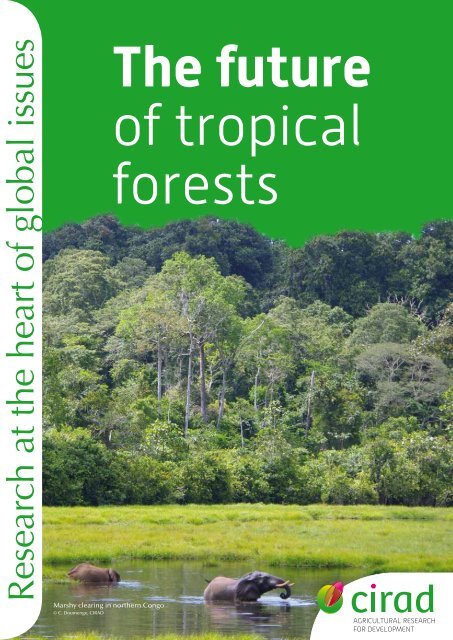
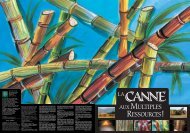

![Version française [pdf, 376,65 ko] - Cirad](https://img.yumpu.com/26838166/1/184x260/version-franaaise-pdf-37665-ko-cirad.jpg?quality=85)
![VIP N°4 [FR] - Cirad](https://img.yumpu.com/26838163/1/184x260/vip-na4-fr-cirad.jpg?quality=85)
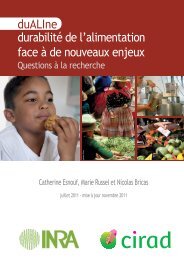
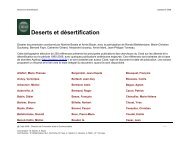
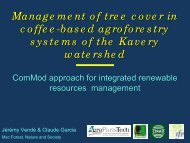
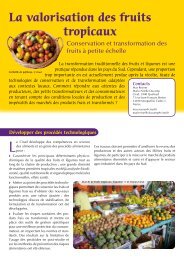

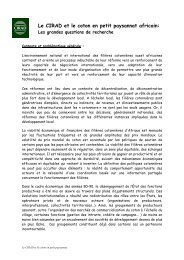
![VIP N.4 [ESP]--> PDF - Cirad](https://img.yumpu.com/26838123/1/184x260/vip-n4-esp-pdf-cirad.jpg?quality=85)
![Version française [pdf, 493,34 ko] - Cirad](https://img.yumpu.com/26838117/1/184x260/version-franaaise-pdf-49334-ko-cirad.jpg?quality=85)
![Version française [pdf, 180,31 ko] - Cirad](https://img.yumpu.com/26838111/1/184x260/version-franaaise-pdf-18031-ko-cirad.jpg?quality=85)
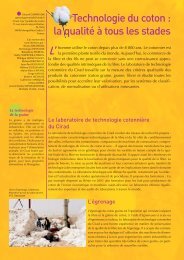
![VIP N.3 [GB]-->WEB - Cirad](https://img.yumpu.com/26838098/1/184x260/vip-n3-gb-web-cirad.jpg?quality=85)